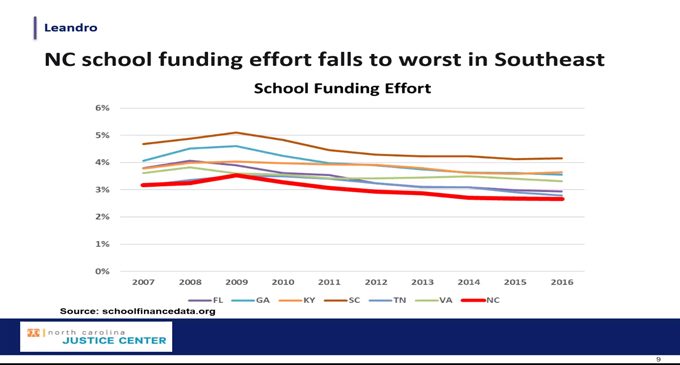Leandro ruling could bring much needed aid to N.C. public schools
This graph provided by the NC Justice Center shows how NC compares to other states in the Southeast when it comes to funding education.

Earlier this week, Knollwood Baptist Church and Action4Equity held a virtual gathering to discuss the recent findings in the state’s landmark constitutional education case, Leandro v. North Carolina, and how it will impact the future of K-12 education funding across the state.
The Leandro school funding case began in 1994 when five school districts (Hoke, Halifax, Robeson, Vance, and Cumberland) filed a lawsuit against the state, arguing that their school districts did not have enough money to provide an equal education for their children.
Since the case was opened more than two decades ago, the N.C. Supreme Court has ruled twice that the state has a constitutional obligation to ensure all children have access to a sound education which includes competent and well trained teachers and principals, as well as equitable access to sufficient resources.
Although the rulings in the cases in 1997 and 2004 declared that the state constitution guarantees every child the right to a sound education and that the states efforts to educate children from poor families were inadequate, the N.C. Supreme Court did not put any solutions in place to fix the problem.
That is until 2016, when Superior Court Judge David Lee took over the case.
Two years after taking control of the case, Judge Lee ordered WestEd, an independent educational consultant, conduct a study and make recommendations on ways to remedy the issues. In December 2019, WestEd released their findings, along with a list of eight critical needs that the state must address to ensure every child in the state receives a sound education. Here’s a list of the recommendations made by WestEd:
1. Revise the state-funding model to provide adequate, efficient, and equitable resources.
2. Provide a qualified, well-prepared and diverse teaching staff in every school.
3. Provide a qualified and well-prepared principal in every school.
4. Provide all at-risk students with the opportunity to attend high-quality early childhood programs.
5. Direct resources, opportunities and initiatives to economically disadvantaged students.
6. Revise the student assessment system and school accountability system.
7. Build an effective regional and statewide system of support for the improvement of low-performing and high poverty schools.
8. Convene an expert panel to assist the Court in maintaining state policies, plans, programs and progress.
When discussing the Leandro ruling during the online gathering dubbed “Equity and Access: Now, More than Ever,” Matt Ellinwood, director of the N.C. Justice Center’s Education and Law Project, said although the case is very complex and has been going on forever, when you break it down it’s really pretty straightforward. “It’s the state who has the responsibility to provide every child with access to a sound, basic education and the state has continued to not meet that minimal standard.”
According to the WestEd report, over the past decade or so, the state has moved even further away from meeting the standards when it comes to education. While going over several charts and graphs that compared teacher pay, per pupil spending, state funding effort, and other information in North Carolina to other states, he said although we weren’t doing that well in 2009, we were moving in the right direction.
“In 2008-09 we were about 12% below the national average in teacher pay and now we’re about 14%,” Ellinwood said. “Probably the bigger problem is our teacher pay is one of the least competitive in the nation … when comparing teacher pay to other jobs in North Carolina with similar education and experience, North Carolina ranks 45th … with teachers earning about 27% less than their peers in other professions.”
Ellinwood said the state has also seen a major decline in resources. He said since 2009, the state has 35.6% less teacher assistance, 40% less central office employees, 17.1% less non-instructional support employees, more than 50% less textbooks, supplies, and materials.
To meet the standards outlined by the N.C. Supreme Court, WestEd recommends that the state invest about $4 billion over the next eight years into the education system. According to Ellinwood, that could increase funding by about 36%, teacher pay by 20%, and bring an additional 220 teachers’ assistants to the district. “If we really follow these recommendations, really huge consequences locally in Winston.”
The deadline for the state to submit recommendations for an implementation plan was originally scheduled for March, but has been pushed back to the end of May due to the COVID-19 (coronavirus) pandemic.
Ellinwood said the N.C. Justice Center’s Education and Law Project is working with a coalition of organizations to help spread the word about the findings in the Leandro case and how it can impact local school districts.
“We’re working with a really diverse coalition that represents each of these different student groups and it’s called Every Child NC and we’ll have a website coming up in a few weeks, but we’re really trying to come together around these findings and advocate at the state level and in the court case for actually implementing them and ensuring that they’re centered and meet the needs of the communities that are most impacted.”
The virtual town hall hosted by Knollwood Baptist Church and Action4Equity can be viewed by visiting “Action4Equity” on Facebook. The virtual gathering was part of Knollwood Baptist Church’s series of conversations entitled Faith in the City. On the first Tuesday, October through May, organizers from the church invite speakers to deepen community conversations about complex issues and find ways to work together to address injustices.









